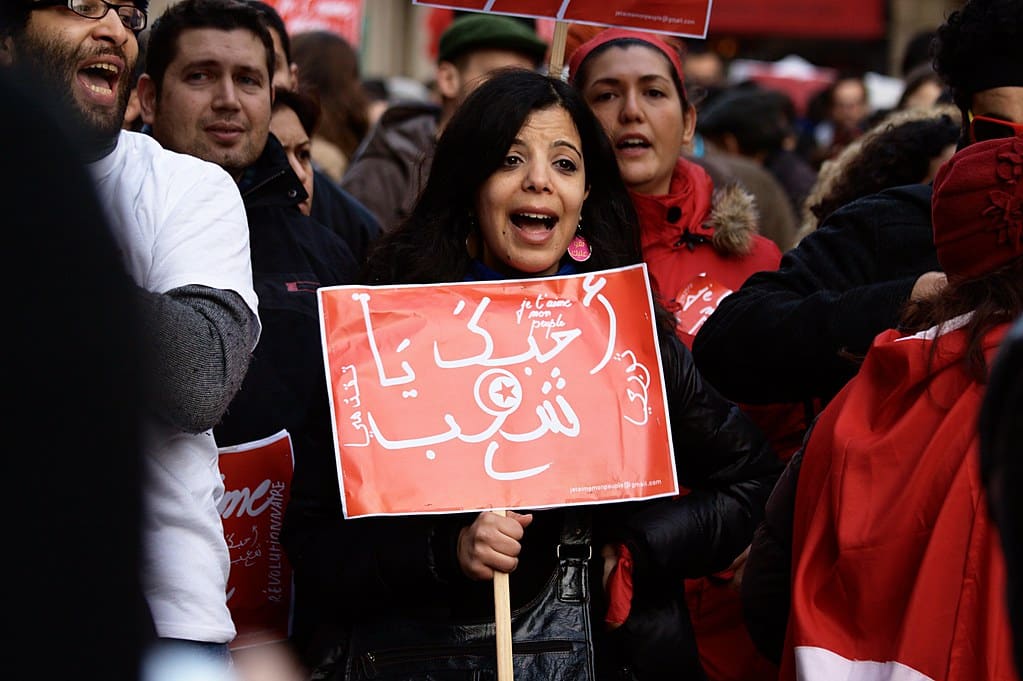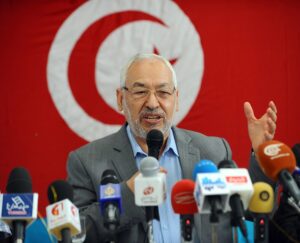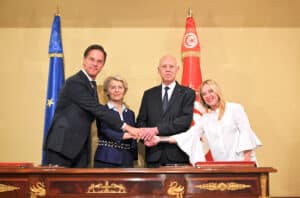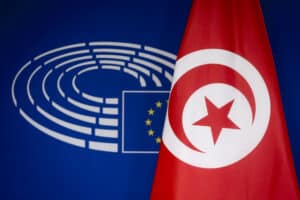On February 18, thousands of Tunisian trade unionists have held protest across the country over the worsening economic woes and the arrest of a top union official. They also protested to defend their union rights. The government of Tunisia is currently in drawn-out talks with the International Monetary Fund (IMF) for a bailout loan, which the powerful Tunisian General Labour Union (UGTT) warned could entail painful austerity measures. Some protesters raised loaves of bread as a symbol of protest at soaring living costs. The protests in eight cities marked an escalation in the union’s confrontation with Tunisian President Kais Saied and followed its criticism of the recent arrest of several anti-government figures including politicians, a journalist, two judges and a senior UGTT official. The coordinated arrests have raised fears of a wider crackdown on dissent and prompted the UN Human Rights Office to call for the detainees’ immediate release.
Crackdown of democracy
Protesters demanded the release of senior UGTT official Anis Kaabi, who was arrested on January 31 following a strike by toll barrier workers, in what the union described as “a blow to union work and a violation of union rights”. Othmane Jallouli, the UGTT’s deputy chief, told demonstrators that “the government has failed to put the country on the path of economic and social reforms. All it has succeeded in is attacking the union”. The latest protests came a year and a half after Saied sacked the government and seized almost total power. The union also accused President Saied of the arrests as a distraction from record low election turnout and the “total failure” of his economic policies.
Tunisia held elections last weekend for a parliament stripped of its powers by Saied. It was boycotted by almost 90 percent of voters after critics accused him of trying to silence his political opponents. The president of the UGTT, Mr Taboubi said: “”Why is the UGTT a target? Because the authorities want to pass the painful reforms they are always discussing. In order to pass these painful reforms, they need to distract the public with trivia by saying that the reason for this situation is the UGTT.” The head of the million-member union federation, which jointly won the 2015 Nobel Peace Prize for its role in Tunisia’s democratic transition, said Kaabi had been arrested to send “a clear message, that the UGTT is a target”.
Discontent is flooding the Tunisian streets and the UGTT is talking about mass protest and “occupying the streets’ to show their rejection of the budgets announced by the Minister of Finance, Shihem Boughdiri.Tunisia’s crisis has left inflation at about 10% and the new measures to strengthen the economy again has been met negatively in society. Noureddine Taboubi, said that “they will not accept this situation” and that “they will take to the streets to defend their choices and interests of the people”. He also calls Saied’s government “a tax-collecting government” and considers that the Finance Law increases the suffering of Tunisians because the taxes for various professions such as lawyers and engineers will increase. The announcement of these new budgets comes subsequent to the rise in the price of drinking water and fuel prices due to the country’s energy crisis.
Dialogue or further isolation
According to Esther Lynch, the European trade union chief who was expelled because of her participation in the protest, stated that “The UGTT has an important role to play in helping Tunisians come through the crisis”. She added that “There is no way out of the impasse the country is going through except through dialogue, and there is no room for individual rule in Tunisia”. Tunisia has been in the throes of a deep political crisis that aggravated the country’s economy since 2021 when Saied ousted the government and dissolved parliament. Since then, Saied held a referendum to draft a new Constitution last July and parliamentary elections last December. While he insists that his measures were meant to “save” the country, critics have accused the Tunisian leader of orchestrating a coup. The UGTT wants to have a national dialogue to resolve Tunisia’s international political disputes, but it has been ignored by the president. Efforts to secure a foreign bailout for state finances have stalled, with ratings agencies saying Tunisia risks default even as an economic crisis has caused shortages. Internationally, Tunisia has rarely looked more isolated, with Western aid reduced, no sign of Gulf support and a new spat last week with main ally and neighbour Algeria. Meanwhile parts of the long-fractured opposition are starting to talk about ways to put aside their old enmities to coordinate action against Saied
Author: Manouk Bronzwaer



